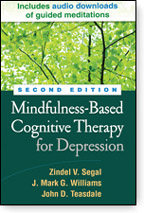Depression
Learning to Teach MBCT Practices Via the Web: Technology Supporting Teacher Development
Online Training for Teaching Mindfulness In Your Clinical Practice
Hurrying up so we can slow down!
Well of course that makes sense! We leave work and drive too fast to get home so we can finally relax. Between patients we scribble notes in the file, run to the bathroom, and make a phone call while slurping caffeine so that after the next patient we can catch our breath. We inhale lunch without looking at it while we order holiday gifts on online because we don’t want to waste time just eating.
MBCT Ushers in the Next Era with Second Edition and Two Innovative Training Opportunities
 Few psychological interventions have engendered so much promise and delivered on that promise with such impressive clinical outcomes and research findings as Mindfulness-Based Cognitive Therapy (MBCT).
Few psychological interventions have engendered so much promise and delivered on that promise with such impressive clinical outcomes and research findings as Mindfulness-Based Cognitive Therapy (MBCT).
Mindfulness Interventions for Bipolar Depression
Bipolar disorder is a severe psychiatric illness characterized by episodes of depression as well as periods of elevated mood, known as mania. This condition, previously known as manic-depressive illness, causes considerable suffering and disability. Furthermore, bipolar depression is often difficult to treat and associated with anxiety symptoms and an increased risk of suicide. Thus, additional treatment approaches are needed. Interventions that target anxiety and suicide risk, in addition to depression, could be particularly useful.
CBC News Segment on Mindfulness and Mental Illness Features MBCT and Zindel Segal
Looking for a nice introduction to how and why mindfulness might be helpful in regard to depression and anxiety? This segment from CBC's The Journal program does a great job of noting how mindfulness has become a standard approach to dealing with mood disorders and features one of the developers of Mindfulness-Based Cognitive Therapy (MBCT), Zindel Segal talking about how it all works.
Lead Author Zindel Segal Comments on Study Comparing MBCT to Antidepressants

Zindel Segal of the University of Toronto, lead author of a study published in the Archives of General Psychiatry that found no difference between antidepressant medication and Mindfulness-Based Cognitive Therapy (MBCT) in preventing relapse in depress
New Study Highlights the Relationship Between Rumination and Mindfulness
A study just published in the Springer journal Mindfulness by Raes and Williams, explores the relationship between rumination and mindfulness. From the abstract: "when controlling for current depressive symptoms and prior history of depression, mindfulness was significantly negatively correlated with rumination, but it was only associated with the extent to which rumination was experienced as uncontrollable, not with global levels of rumination.